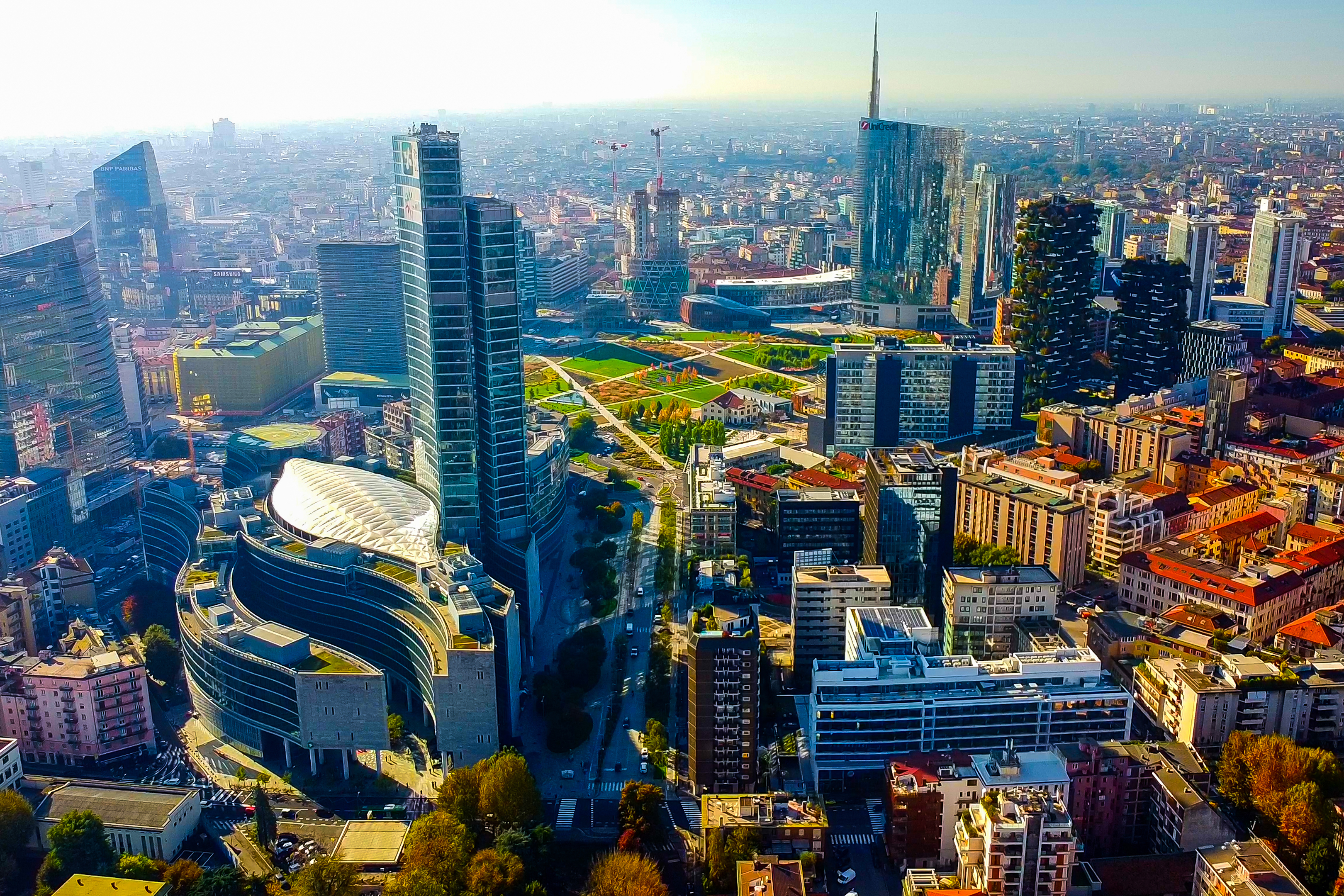A residence permit in Europe is the key to legal relocation. In 2025, foreigners often search for the cheapest and fastest ways to get a residence permit in EU countries. Such a status certifies temporary residency in one of the European countries. It allows foreigners to legally stay in the country for a certain period (usually from 12 months to 4 years, with the opportunity for renewal) and apply for relocation with family members and later naturalization. A legal status in Schengen zone countries gives applicants access to visa-free travel within the territory of the agreement. A European resident can usually find a job, study, start a business, and receive social, medical, and financial support. According to the latest Eurostat data, the EU issued 3,741,015 first residence permits in 2023, a 4.7% increase versus 2022 — the highest level on record.
A residence permit can be obtained for the legal grounds listed in the Law on Foreigners or a similar legal act. Official programs can facilitate the process, such as purchasing real estate, achieving financial independence (FNL), registering a business, or being employed by a local company. The article discusses the advantages of European residency and the most common ways to obtain it, including the associated costs.

European residence permit benefits
Obtaining a European residence permit opens the door to the following opportunities:
- Residence in the chosen country without additional restrictions or documentation requirements.
- The right to leave and return without a separate visa.
- Travel within the European Union under the 90/180-day stay regime (for Schengen area residents).
- The opportunity to officially find employment and/or conduct commercial activities (though not all types of permits allow this).
- Obtaining loans and mortgages, as well as opening bank accounts and deposits on favorable terms that are unavailable to non-residents.
- Access to education, including free schooling for minor children of foreigners and attendance at kindergartens.
- State aid and support, including attendance at integration courses, financial subsidies, and benefits due to status.
- Access to high-quality European medicine at state expense or under basic health insurance.
- Immigration with close relatives and opening a temporary residence card for them.
- Prospect of naturalization and registration for a European passport.
A temporary residence permit (TRP) gives the right to legally stay in the country for 1–5 years with the possibility of renewal. Permanent residence (PR) is usually issued after several years of living with a trp and allows you to live in the country without time limits, enjoy almost all the rights of citizens (except voting). Naturalization and citizenship are the final stage of immigration: the applicant receives a passport of the EU country and full rights, including visa-free travel outside the Schengen area.
Legal grounds for a residence permit in Europe
Most often, foreigners apply for a residence permit in European countries for the following reasons:
- Work.
A temporary residence permit is issued to individuals employed by a European company. The applicant may be required to have a diploma and/or work experience in their specialty - Education.
A residence permit in the EU is granted to foreigners enrolling in an educational course, including university and school programs, as well as international exchange programs and internships. The applicant must demonstrate that they can support themselves during their time in the country. - Commercial activities.
Most European countries attract foreign businesspeople to stimulate economic growth and grant residency to individuals who register a company within their borders. A temporary residence permit may also be granted to individuals who purchase shares in an existing business. - Investment.
An immigrant has the right to apply for a temporary or permanent resident card by investing large sums in the economy of one of the European countries. The relevant legislation specifies the minimum investment threshold and areas of financial investment (from EUR 10,000 in Malta to EUR 2,000,000 in Spain). - Financial independence.
Some European countries offer residency to individuals who have the means to live without working or running a business. This method of immigration is usually relevant for retirees or individuals with passive income from abroad, such as landlords or shareholders of enterprises, or those with stable remote work. - Special activities.
A foreigner can obtain the right to stay in the European Union and other territories as a research fellow, accredited journalist, visiting teacher, religious minister, official volunteer, or person requiring medical assistance. Typically, these permits are short-term and do not allow for naturalization. - Humanitarian reasons.
Recognized refugees and applicants for international subsidiary or temporary protection may apply for European residency. Law enforcement and migration authorities consider each request individually, based on the applicant’s situation. - Family reunification.
As part of family reunification, spouses, official cohabitants, children, and parents of local citizens or legal immigrants can obtain European residency. The host may be required to prove financial security and sufficient living space for relatives.In practice, the rules for family reunification differ by country. For example, in Spain, a residence permit holder can bring a spouse, minor children, and in some cases dependent parents. Hungary usually grants the right to relocate only to a spouse and children under 18. In France, close family members (spouse, minor children) can apply together with the main applicant under programs like the Passeport Talent. Italy also allows reunification with dependent relatives, but the applicant must prove sufficient housing and income. Such details are important to consider when planning relocation with family members.

Giving birth in Europe does not grant residency or citizenship to the child or their parents. It is also impossible to legally purchase this status; however, applicants can apply for a residence permit based on financial investments in the corresponding state’s economy. The easiest way to obtain a temporary European residence permit is by registering a business or investing as a financially independent or employed person.
Some European countries, such as Serbia and Montenegro, provide a residence permit when opening a business with authorized capital of EUR 1. Professional lawyers can provide , from registering a business to obtaining a residence permit.
How to get a residence permit in Europe
The process is usually regulated by the relevant country’s Law on Foreigners. This law specifies the grounds for obtaining resident status, the procedure, authorized bodies, state fees, and the time frame for processing requests. The standard procedure for obtaining a European temporary residence permit includes the following steps:
- Prepare the necessary documents and schedule an appointment with a diplomatic agency to apply for a visa or residence permit. The applicant creates a dossier according to the grounds on which they plan to request an entry or residence permit and, if necessary, registers online to visit the consulate or embassy of the selected country.
- Depending on the state, the applicant applies for a temporary residence permit or a long-term national visa. They personally submit an application and a package of documents to the diplomatic mission. If necessary, they undergo an interview and biometrics procedure.
- Wait for a response and receive the document. Authorized bodies typically consider requests from foreigners for a visa or residence permit within 2-3 weeks to 6 months. If the application is approved, the applicant is given a residence card or visa affixed to their passport.
- Move to the selected country and process local documents. If the applicant received a national visa at a diplomatic mission, they apply to the migration service upon arrival in the relevant state for a temporary resident card. The average processing time is 1-2 months.
, the process of obtaining a European residence permit can be as simple as possible.
Cheapest residence permits in Europe 2026: easiest countries to apply
The cheapest residence permits in Europe are provided by Montenegro, Spain, Serbia, Hungary, and France. Applicants are required to make minimal investments, pay state fees, submit a basic package of documents, and comply with simple conditions for obtaining the status.
Montenegro
Foreign businessmen can obtain a residence permit on the basis of commercial activity. Applicants have the right to register a company in the country with authorized capital of EUR 1. With the support of specialists, opening a business takes about a week. A residence permit through company ownership is issued within a month and is valid for one year, with the opportunity to renew.
Applicants must have at least EUR 3,650 in a Montenegrin bank account, which they can withdraw within 24 hours of receiving an account statement. Citizens of certain countries are exempt from obtaining a category D entry permit and can move to Montenegro under a visa-free regime. Afterward, they can apply for resident status.
Spain
Foreigners often apply for a student residence permit in Spain to study the language offered by local courses. Applicants are not required to make any financial investments; having at least EUR 7,200 in a bank account is sufficient proof of financial security for subsequent residence in the country. There are no special requirements for applicants; the main requirement is having no criminal record and taking an educational course to maintain and renew the status.
With the help of experienced migration specialists, the residency registration process takes 3-4 months. Afterwards, the applicant can renew the residence permit based on other criteria, such as employment in Spain after moving there.

Serbia
Foreigners who register as sole proprietorships, limited liability companies, or other legal entities have the opportunity to apply for a residence permit in Serbia. The process of starting a business in the country is straightforward and takes approximately 5 days. The Republic does not require a minimum authorized capital or scope of activity for a commercial enterprise, nor does it require knowledge of the local language or possession of a diploma. A residence permit is granted for 6-12 months, with the right to extend.
Applicants do not have to hire employees but must pay contributions to the retirement and health insurance funds. Serbia issues residence permits to all foreigners, and the registration process takes up to 2 months with the help of immigration lawyers.
With a Serbian residence permit, you benefit from:
- The opportunity to work anywhere in Europe;
- The prospect of opening a business with low taxes;
- A residence permit in an EU candidate country;
- Social support from the state.

Leave an application and get a consultation specialist
Hungary
Applicants have the right to apply for a residence permit in an Eastern European country after receiving a job offer from a private or state-owned company. Foreigners are granted resident status for 24 months with the opportunity to re-register. After three years, applicants can become permanent residents. International lawyers can help foreigners obtain a work residence permit with minimal language requirements and under simple conditions.
From the moment applicants contact iWorld specialists, it takes four months to obtain a work residence permit in Hungary. Applicants must have at least EUR 500 in a bank account to confirm solvency. If desired, applicants can pay their own taxes in order to later apply for a retirement pension.
France
The country provides a special document, the passeport talent, for individuals who start a business on its territory. Applicants are not required to know the national language. The applicant receives a 4-year residence permit in France and has the opportunity to immigrate with family members without waiting for them to receive separate residence permits. With the help of immigration specialists, foreign nationals can obtain the desired status within 3-6 months of starting the process.
| Country | Minimum requirements | Processing time | Duration of permit |
|---|---|---|---|
| Montenegro | Open a company with €1 capital, have €3,650 in a bank | ~1 month | 1 year (renewable) |
| Spain | Student program, €7,200 in a bank, no investments | 3–4 months | 1 year (renewable) |
| Serbia | Register company/sole proprietorship, pay contributions | ~2 months | 6–12 months |
| Hungary | Job offer or company registration, €500 in a bank | 3–4 months | 24 months (renewable) |
| France | Passeport Talent (business or financially independent) | 3–6 months | Up to 4 years |
| Czech Republic | Employment + diploma (Blue Card) | ~3 months | 2 years (renewable) |
| Finland | Open/startup company, no language requirements | ~2 months | 2 years (renewable) |
| Italy | Register a company, no capital threshold | ~3 months | 2 years (renewable) |
Fastest ways to get a European residence permit: top countries
The easiest countries in Europe to obtain a residence permit are France, the Czech Republic, Hungary, Finland, and Italy. These countries have simple immigration programs based on business ownership or employment, and they grant the desired status within several months at most.
Czech Republic
iWorld specialists help applicants obtain an EU Blue Card, which is a special residence permit issued to employed individuals with higher education in the Czech Republic. Applicants must have a diploma qualifying them for at least a bachelor’s degree. The residence permit is issued within three months of signing an agreement with immigration lawyers. The Blue Card allows the holder to immigrate with family members. Two months after receiving the document, the applicant may replace it with a standard work residence permit that comes with a reduced tax burden.
Czech residence through employment is granted to applicants without financial security or language proficiency requirements. If desired, applicants can pay taxes and qualify for a full social package, including health insurance and retirement contributions.
Hungary
This Eastern European country grants a 2-year residence permit, with the right to extend, to foreigners who register a company there. Legislation does not regulate the size of authorized capital or the scope of activities of future enterprises. Applicants only need to have EUR 500 in a bank account as proof of solvency and attach a diploma from a higher or secondary specialized education institution to the general package of documents for a residence permit.
Depending on the applicant’s citizenship and whether immigration lawyers are involved in the process, a residence permit in Hungary through opening a business is issued in 1-3 months. The specialists can also assist with registering a company in Europe, preparing constituent documents, connecting to the state tax system, and opening a bank account. After three years, a foreigner can apply for permanent residence, at which point there is no need to maintain a legal ground for staying in the country.
Finland
Foreigners have the opportunity to obtain a residence permit by opening an innovative enterprise in the country. The applicant is granted resident status immediately for 2 years with no language proficiency requirements. Finland attracts foreign businesspeople by offering the opportunity to develop a startup on the international market with low start-up capital. With the help of international law specialists, applicants can use a ready-made business plan.
With the help of legal professionals, an applicant can obtain a Finnish residence permit within 2 months. Additionally, they assist with selecting and registering the most suitable startup project.
Italy
An Italian residence permit is granted to foreign businesspeople who are willing to establish a company in Italy. The country does not impose requirements on the size of authorized capital, nor does it limit applicants to a specific field of activity or location of the company. The state attracts businesspeople with a simplified tax reporting system and the opportunity to obtain an Italian residence permit in as little as 3 months with the help of international law specialists.

France
The French Republic provides favorable terms for financially independent individuals to reside in the country. Applicants can apply for 12-month resident status, which can be renewed annually. After five years, they can apply for permanent residence. To obtain a French residence permit for the financially independent persons, a foreigner must have at least EUR 16,000 in a bank account, which they can dispose of at their own discretion. The applicant should also rent or purchase real estate with an area of 9 m² and purchase health insurance.
The Republic does not set quotas for resident cards, so applicants who meet the requirements are guaranteed to receive status. With the support of international law specialists, it takes immigrants about 2-3 months to obtain a residence permit. In addition to having the aforementioned amount in their account, applicants must have the financial means to pay the state fee and for the services of accompanying persons.

Documents required for a European residence permit
The standard dossier required to obtain a residence permit in the European Union (or other countries on the continent) includes the following:
- A foreign passport valid for at least three months after the expected departure date to your home country.
- Civil status certificates (e.g., marriage, divorce, or birth of a child), if applicable.
- Proof of eligibility to apply for a residence permit, such as a business registration certificate, bank statement for the financial independent persons, or employment contract.
- Medical insurance with coverage of at least EUR 30,000.
- A receipt for payment of the administrative fee.
- A certificate of no criminal record issued in your home country.
When applying for a residence permit in the EU or other European territories with the help of international law specialists, applicants only need to provide an identity card and civil status documents. Legal professionals request the remaining components of the dossier from the relevant authorities themselves.
Approximate costs of obtaining a residence permit in Europe
The total expenses depend on the country and the chosen program, but usually include several standard items:
- State fees and administrative charges – from €50 to €500 depending on the country.
- Proof of financial security / bank deposit – from €500 in Hungary to €16,000 in France; for Spain, students must show about €7,200 in their account.
- Real estate or business investments – from €1 authorized capital in Montenegro to €2,000,000 in Spain for investment residence permits.
- Health insurance – minimum coverage of €30,000 is usually required, cost starts from €200–400 per year.
- Legal and translation services – professional support typically costs €1,000–€5,000 depending on the case and country.
On average, the initial budget for obtaining a residence permit in Europe ranges from €2,000–3,000 (for simple programs such as business registration in Serbia) up to €20,000 or more (for financially independent persons or investors).
Residence permit renewal in Europe
Not all residence permits in the EU and the rest of Europe can be renewed. For instance, resident status granted for medical treatment or scientific research typically expires after a set period of time. However, holders of a student residence permit can often apply for a similar document based on other criteria, such as seeking employment. A residence permit for employment, issued through investment or business ownership, is often an immigration document that allows the holder to later apply for citizenship in the country.

Applicants can extend their EU residency if they still have a reason to stay in the relevant state. The applicant prepares a package of documents, fills out an application, and submits it to the territorial department of the migration service or the Ministry of Internal Affairs. Specialists are also responsible for renewing the legal status of applicants, which saves immigrants time and money.
Obligations and limitations for residence permit holders in Europe
Obtaining a residence permit is only the first step. Most countries require foreign residents to follow certain rules in order to maintain their status:
- Minimum stay requirement – many EU states oblige residents to live in the country for at least 183 days per year, otherwise the permit may not be renewed.
- Tax residency – after becoming a resident, you may fall under the local tax system and be required to declare worldwide income.
- Proof of financial means – at each renewal stage, applicants usually need to confirm solvency with bank statements, contracts, or investment documents.
- Medical insurance – continuous coverage is often a mandatory condition for keeping the residence permit valid.
- Housing – in some states, residents must maintain a rental contract or own property during the entire period of residence.
Failure to comply with these obligations may result in refusal of renewal or even cancellation of the residence permit.
Why residence permit applications in Europe get refused
- Criminal record or security concerns – applicants with convictions or connections to illegal activities are often rejected.
- Previous violations of EU or Schengen visa rules – overstaying, illegal work, or deportation history can lead to refusal.
- Incomplete or false documentation – mistakes, missing certificates, or falsified papers are common grounds for denial.
- Insufficient financial means – if the applicant cannot prove stable income or required savings.
- Unrealistic or fictitious grounds – sham marriages, fake job offers, or non-existent businesses.
- Health-related issues – in some cases, lack of required insurance or serious contagious diseases may be a reason.
Careful preparation of the application, professional legal review, and accurate supporting documents significantly reduce the risk of refusal.
Residence permit in Europe with full legal support
Reviews confirm that legal support increases the chances of acquiring the necessary residency. iWorld specialists perform most tasks for clients, including requesting missing documents from government agencies and registering for and accompanying clients to appointments with authorized bodies. Migration lawyers personally review each applicant’s case and recommend the most cost-effective, fastest, and simplest programs for moving abroad.
Sign up for to get detailed information about the prospects of immigrating to Europe.
















